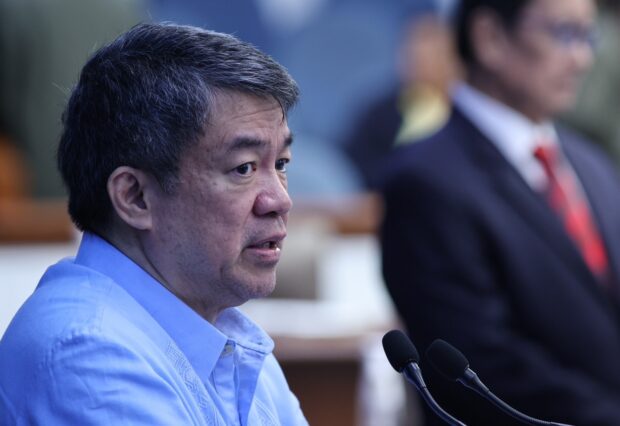Gov’t gears for SC suit vs 2024 budget

Senate Minority Leader Aquilino “Koko” Pimentel III —Joseph Vidal/Senate Social Media Unit
MANILA, Philippines — Malacañang is ready to answer any legal questions on the 2024 General Appropriations Act (GAA) signed by President Marcos on Dec. 20, according to Presidential Communications Secretary Cheloy Velicaria Garafil.
“Yes, of course,” Garafil told the Inquirer on Wednesday when asked if the Palace was confident it would be able to argue for the constitutionality of the 2024 budget before the Supreme Court.
Her response came a few hours after Senate Minority Leader Aquilino Pimentel said he was set to challenge the 2024 GAA before the Supreme Court.
But at press time, no petition against the 2024 national budget has been filed at the high court.
Pimentel earlier said the unprogrammed funds in this year’s budget increased to P731.4 billion from the original P281.9 after the bicameral conference committee meetings on the P5.768-trillion General Appropriation Bill for 2024.
Article continues after this advertisementAccording to him, this resulted in a P449.5-billion increase in the unprogrammed funds, which he said was unconstitutional.
Article continues after this advertisementThe insertions made the national budget more than P6 trillion and not just P5.77 trillion as submitted by the executive branch to Congress.
Former Sen. Panfilo Lacson had urged the president to veto the P449.5-billion increase in the unprogrammed funds.
“Items can be reduced or realigned from one agency to another but the Constitution prohibits adding to the so-called president’s budget,” he explained.
Days before the signing of this year’s national budget, Garafil told the Inquirer that President Ferdinand Marcos Jr. would review the national budget for 2024 passed by Congress.
But in his veto message, Marcos did not veto the P449.5-billion increase in the unprogrammed appropriations.
He instead vetoed only two provisions—a revolving fund of the Department of Justice and one item pertaining to the implementation of the National Government’s Career Executive Service Development Program.
Budget Secretary Amenah Pangandaman told reporters after the budget signing that unprogrammed funds “have triggers” and could only be released “if you have additional revenues.”
“So, I don’t think it is [unconstitutional]. And I think that is also the stand of BBM (Bongbong Marcos), and some of the members of the House and the Senate,” she said.
The president has not made any public statement regarding the increase in the unprogrammed funds in the 2024 national budget.
Unprogrammed
In a statement on Wednesday afternoon, the Department of Budget and Management (DBM) explained that unprogrammed appropriations “are standby appropriations, outside the approved government fiscal program, which serve as an important tool for the government to address unforeseen expenditures and prioritize essential programs and projects.”
The DBM said it was not included in the P5.7676-trillion budget for 2024, adding that it refers to standby appropriations that are also proposed for legislation and to be authorized by Congress.
The agency pointed out that unprogrammed funds in the 2024 national budget “are not automatically allocated” and could only be released if several funding conditions are met, such as when the government, through the Bureau of Treasury, is able to collect excess revenue in the total tax revenues or any of the identified nontax revenue sources from its revenue target, or new revenue from new tax or nontax sources, or should foreign or approved financial loans or grants proceeds are realized.
“Should there be new or excess revenues that may trigger the availability of the unprogrammed funds, government agencies are required to submit the necessary documentary requirements before access to the standby funds is given. Such conditions ensure that spending stays within allowable limits,” the DBM said.
It noted that pursuant to the constitutional provision under Section 29 (1), Article VI, it is prescribed that, “No money shall be paid out of the Treasury except in pursuance of an appropriation made by law.”
“It is therefore clear that the deliberation and approval of the limits of any appropriations is within the purview of the legislature,” it said.
“Rest assured that regardless of any petition or challenge, the DBM shall work within our approved fiscal program,” it added.